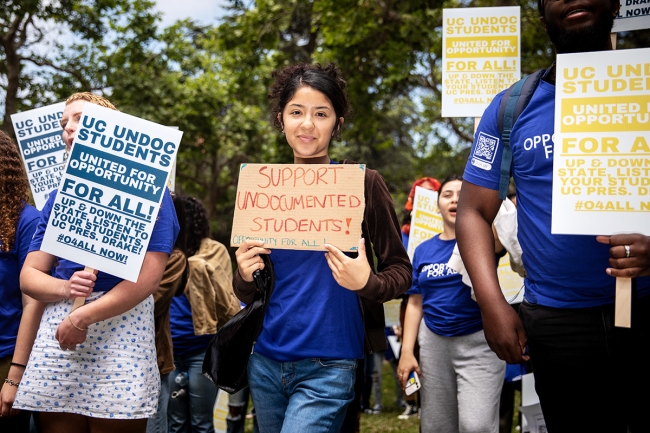You have /5 articles left.
Sign up for a free account or log in.

Nearly 100,000 undocumented students graduate from U.S. high schools each year, and they can’t access federal college-prep programs because of a decades-old federal law. The Education Department is proposing to open up those programs to noncitizens, a long-sought priority for advocacy groups and higher education associations.
The Education Department wants to open up some federal college-prep programs known as TRIO to undocumented students. But some college and school administrators are worried about potential political backlash, particularly from Republicans in Congress, and they want the Biden administration to hold off.
“Across campuses, TRIO programs are constantly fighting for support,” said D’Angelo Sands, executive director of college access and outreach at Texas A&M University at Corpus Christi. “We are very much aware of the political climate, and the TRIO programs have been a target.”
Sands was one of several people who spoke against the department’s plan at a Friday meeting of an advisory subcommittee convened to weigh in on the proposal. He and other members of the subcommittee said they generally like the idea of expanding the TRIO programs, but they were hesitant to back the policy change due to fears of unintended political consequences. Those opposed to providing public benefits to undocumented students could use the policy change as a reason to cut the programs’ funding, they argued.
TRIO programs help low-income, first-generation and other underserved students get to and through college. More than 880,000 students participate in TRIO annually. The federal government spent about $1.2 billion on the programs last fiscal year. TRIO would receive the same amount under proposed budgets in the House and Senate, which are currently up for negotiation.
“The fighter in me thinks that this is a tough time to go to battle and have an unforced error or a target on our backs and TRIO given the contentious nature of immigration policy right now,” Geoffrey Garner, TRIO program director at Multnomah Education Service District in Oregon, said at the meeting. “Our responsibility is to protect all of our TRIO students that we’re currently serving … We just think right now is not the best time for this proposal, as much as it breaks my heart to say that out loud and in public.”
Only one of the five subcommittee members supported the department’s position Friday. The subcommittee will meet again Feb. 9 and then present its recommendations to a broader rule-making committee that will also review the proposal. The department isn’t bound to follow the committee’s recommendation unless it reaches unanimous agreement. Any change to the rules governing TRIO will be subject to public comment.
Undocumented students have been barred from participating in TRIO since 1986 under a change in federal law that also prevented them from receiving federal grants, loans or work assistance.
Ending the TRIO prohibition has been a long-sought change for a coalition of advocacy organizations, including several immigrants’ rights groups and higher education associations. Advocates say the statute doesn’t forbid undocumented students from participating in other services under Title IV of the Higher Education Act, which authorizes federal financial aid programs. Changing the rules for TRIO, they argued, would remove barriers for undocumented students.
Several TRIO staffers pushed for opening up the programs at a public hearing last April, which in part led to the department’s proposal. Officials didn’t directly respond to subcommittee members’ concerns about what the policy change could mean for TRIO funding or the program’s support in Congress.
“We have worked so well—TRIO programs and with the Department of Education—to build what we are today and some of the changes we’ve been able to make, and those have not been easy to get through with Congress,” said Wade Williams, who works at the Crowder College Foundation in Missouri and represents current or former TRIO program participants on the subcommittee.
Garner said TRIO programs might face resistance in some states if the policy change went through. He would prefer the department wait to expand the programs “when the time is better politically,” though he didn’t specify when that would be.
The department has recently granted waivers to California and Oregon to allow TRIO programs in those states to serve undocumented students.
Miriam Feldblum, executive director of the Presidents’ Alliance on Higher Education and Immigration, a nonprofit focused on raising awareness about how immigration policies affect students and colleges, said the subcommittee’s discussion was “perplexing.”
“The reasons that were being given were really not about the importance of TRIO or the need for TRIO,” she said. “It seemed to have been some exogenous factors that were unfortunate.”
Supporting undocumented students’ success, she said, should be at the center of conversations about the programs. Nearly 100,000 undocumented students graduate from high school each year, she said, and those students could benefit from TRIO services. Feldblum added that it’s important to address the panel’s substantive concerns and she believes there is a path forward.
“Even as there’s concerns about immigration becoming such a polarized issue, there’s also still broad support for Dreamers right on our campuses, and we’re talking about students who have grown up in our communities,” she said. “The politics of the moment call for urgency of action.”
TRIO includes eight outreach or student services programs geared toward underserved students who meet certain eligibility criteria, including a need for academic support. The department is proposing to expand the number of students who can qualify for Upward Bound, Talent Search and Educational Opportunity Centers to include students who aren’t citizens or permanent residents and who are enrolled in or seeking to enroll in a high school in the United States, territories or the Freely Associated States.
Those specific TRIO programs were picked because they serve students in the public K-12 system, which is open to all students, regardless of immigration status.
Undocumented students still wouldn’t be able to receive the $40 monthly stipend that’s available to those in Upward Bound. That’s because federal law bars undocumented individuals from receiving any federal public benefit, agency officials said.
The stipend provision was an issue for Williams, who preferred that all students in a certain program receive all the benefits. He said he would struggle telling some students that they were losing out.
“That’s almost like a degrading thing,” he said.
Universities could still seek outside funding to offer undocumented students the monthly stipend.
Some subcommittee members pushed the department to consider other changes to the rules governing TRIO programs that would reduce the administrative burden on staff members, provide clarity to directors about allowable costs and improve data collection on student outcomes. They also wanted to see a higher stipend, but department officials said that the $40 figure is part of federal law and the agency can’t change it.




